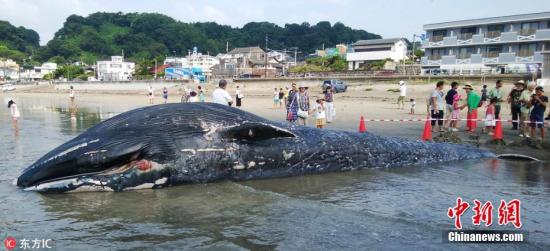China News Service, November 27th, reported that climate warming has impacted Japanese fisheries, and fish catches have been declining for many years. In 2020, the total amount is only 30% of that in the 1980s.
Even the fishermen in Hokkaido complained that local salmon and sea urchins have been decimated in recent years.
Japanese experts predict that this situation will continue; now, the Japanese government encourages fishermen to transform and actively promote artificial breeding.
Data map: Tuna is sold at Tsukiji Fish Market in Tokyo, Japan.
Climate warming drops sharply
Large-scale red tides affect marine life
According to a report by Singapore’s Lianhe Zaobao on the 27th, the total catch by Japanese fishermen in 1984 reached 11.5 million tons, but in 2020 it was only 3.15 million tons.
The catch of some Japanese favorite fish species has also dropped sharply. For example, saury is 90% less than 10 years ago, Japanese flying squid is 80% less, and salmon is 60% less.
In response to the reduction in the catch, the Expert Committee of the Japan Fisheries Agency analyzed that “there are many factors that can be considered, but the increase in sea temperature and changes in ocean currents caused by global warming are a major cause.”
Hokkaido is Japan’s largest fishing ground. The local university’s joint marine research institute put forward temperature data and pointed out that in July, the sea surface temperature in the northern part of the Sea of Japan and southeastern Hokkaido was about 2 to 4 degrees Celsius higher than normal.
Data map: A whale carcass was washed up on a beach in Kamakura, Japan.
Image source: Oriental IC copyright works please do not reprint
Red tide disasters caused by rising temperatures have severely impacted fishing villages on the east coast of Hokkaido.
A 38-year-old local fisherman complained: "Sometimes more than half of the nets I salve are dead fish. At present, the catch of salmon is one-fifth of what it was 15 years ago, and climate problems have affected our livelihoods. "
According to reports, a large-scale red tide in Hokkaido facing the Pacific coast in September has caused the deaths of about 27,700 salmon and about 2,700 tons of sea urchins.
Fuji Kenhiko, a professor of fish ecology at Hokkaido University, pointed out, “Fishes are sensitive to water temperature, and as long as it rises by one degree, it will affect the catch. This situation is expected to continue, so the fishery must follow this change to promote new Only with a healthy food culture can we sustain our livelihood."
Data map: salmon sashimi.
Japanese fishing groups are facing dilemma
Had to move towards artificial breeding
According to related reports, experts discovered in Hokkaido that due to temperature changes, some rare fish species have increased in the coastal waters. Therefore, some local fishermen have also changed due to the situation and changed to catch other fish species to make up for the loss.
Japanese fisheries groups are extremely worried about changes in temperature, and fishermen everywhere have convened coping meetings to discuss this issue that affects their livelihoods.
Increasing ocean temperature affects production, forcing Japanese fisheries to actively move toward "artificial breeding" that is not affected by ocean temperature.
According to reports, global aquaculture production, including freshwater, has tripled in the past 20 years, exceeding 50% of the total fishery production, but currently only 20% of Japan is artificial farming.
According to a report from Kyodo News Agency, Japan’s Fisheries Agency decided in October that in order to combat poaching, it was decided to include sea cucumbers, abalones, and Japanese eels as "eel fry" in order to combat poaching. These 3 types of aquatic products.
This move is intended to make the circulation process from fishing to selling to consumers transparent, thereby reducing illegal fishing and the resulting reduction in aquatic resources.

